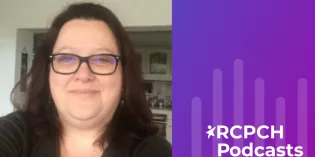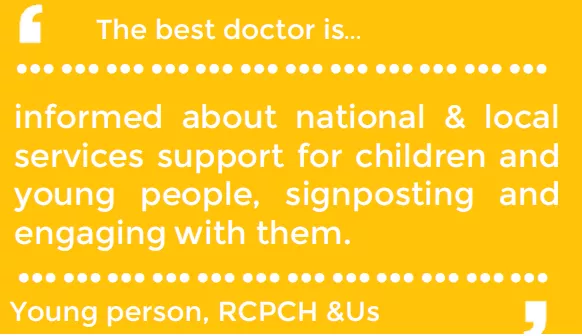- What children and young people say - flyer
- Overview and teaching resource - presentation
- The three key skills - video
- Managing safeguarding - video
- How to demonstrate contribution to the learning outcome - case studies
- Concerns about a colleague - case study
- Family planning for peri-operative planning - case study
- When you don't agree with your educational supervisor about your learning needs / work schedule - case study
- Supervision session - video
- Downloads
These resources related to the curriculum domain 1 - Professional values and professional behaviours. Trainees, supervisors and children and young people have contributed to their development.
What children and young people say - flyer
RCPCH &Us have shared their voices and views with the Children and Young People's engagement team on this curriculum domain.
Download CYP voices flyer below
Overview and teaching resource - presentation
Domain 1 is explained in more detail in this presentation. This could provide you with a better overview or provide you with a resource for a teaching session.
Download teaching presentation below
The three key skills - video
Damian Roland, Consultant Paediatrician at Leicester Royal Infirmary, explains how good communication and shared values are at the heart of paediatrics. He considers three key skills as we progress through training: emotional resilience, situational awareness and the recognition of poor behaviours in others.
Managing safeguarding - video
Amol Chingale, Training Programme Director and Consultant Paediatrician in Lincoln, gives examples on managing safeguarding at different levels of your training.
How to demonstrate contribution to the learning outcome - case studies
These three case studies give examples of evidence that could be used to demonstrate contribution towards the domain learning outcome.
Concerns about a colleague - case study
You put patient safety first and foremost
Setting: General paediatrics
How did the opportunity arise?
One of your SHO colleagues on the general paediatrics rotation appears to be struggling at work. You notice she is always turning up late and seems to be falling asleep in teaching. You have also noticed that she has made a couple of prescribing errors and you whilst you were on call together today, you couldn’t get hold of her for a few hours.
What happened?
You arrange to go for a drink with her after your shift and bring up some of your concerns. You state that you are worried about her and about the impact that her actions may be having upon patient safety.
She confides in you that she is really struggling. She is going through a divorce and her mental health is suffering. You discuss that she needs to tell her supervisor – initially she is not keen, but you state that if she doesn’t tell them, then you will have to. You offer to go with her.
The trainee meets with her supervisor the following day, who suggests she see her GP and puts her in touch with the PHP programme. The trainee is taken off the on-call rota until she is feeling better.
How did this support your development?
You put patient safety first and foremost and raise your concerns with the colleague in question. You thought about strategies to handle this, if the trainee was in agreement versus if they were not. This will help in the future for you being able to handle and support colleagues in difficulty.
Any practical tips?
If there is an immediate patient safety concern, escalate to the clinician in charge of the shift.
Remember there are often reasons why people act the way that they do – if it is appropriate, discuss with them and offer support via various routes.
Family planning for peri-operative planning - case study
Preparation and discussion among MDT for difficult scenarios provides useful consensus support
Setting: PICU
How did the opportunity arise?
Parents of a Jehovah's Witness family refusing red blood transfusion on the ward and at pre-operative checks for PDA (patent ductus arteriosis) ligation
What happened?
Parents of an ex-prem 27 week, CGA (corrected gestational age) of 2 months, due for PDA ligation as an aid to come off respiratory support.
I discussed the case with the consultant beforehand and we agreed on a strategy with use of non-blood therapeutic agents that control haemorrhage and stimulate the production of red blood cells as well as non-blood volume expanders such as crystalloids and colloids, meticulous haemostasis and diathermy, Desmopressin, vasoconstrictors, recombinant erythropoietin and iron therapy and haematinic support.
We discussed in the case of an emergency arising we would need to treat on the basis of what is immediately necessary.
How did this support your development?
Preparation and discussion among MDT (multidisciplinary team) for difficult scenarios provides useful consensus support for the plans suggested.
Seek legal advice when unclear. In an emergency, act in the best interest of the patient.
Any practical tips?
Check your local hospital guidelines for treatment of Jehovah's Witnesses and also the Royal College of Surgeons guideline on caring for patients who refuse red blood cell transfusion.
When you don't agree with your educational supervisor about your learning needs / work schedule - case study
I learnt about the importance of a fair and agreed work schedule
Setting: Community paediatrics
How did the opportunity arise?
Towards the start of my community paediatric placement, I was challenged by my clinical supervisor about not being in the office for my admin work despite the fact that I had completed all of the work, but done so remotely out of hours from home.
What happened?
I had completed all my admin out of hours from home and therefore was essentially claiming back time. This led to a disagreement about expected working patterns with my supervisor.
This issue was possibly aggravated by several other factors including:
- excessive clinic workload after only two weeks of community paediatric clinics
- unknowingly overworking on an erroneous non-compliant rota template.
I spoke to another senior consultant colleague in the department about how I felt and involved the BMA (British Medical Association) regarding my work schedule and rota template.
Subsequently I had a change in my supervisor, clear and agreeable work schedule expectations detailed and a back pay of 90 hours overworked.
How did this support your development?
I learnt about the importance of a fair and agreed work schedule and the utility of calling for help from seniors and other useful organisations with more experience. I have subsequently also attended a conflict resolution training session which has given me the confidence and skills to handle such difficult discussions and scenarios in the future.
Any practical tips?
Always ask for a rota template and agree on a work schedule and get these checked by the BMA.
Speak regularly to your supervisor and keep them updated and they will support you through any issues you may come across. If not, there’s always someone else around to help.
Supervision session - video
This film is designed to help supervisors and trainees work with the new curriculum during their supervision sessions.
Special thanks and acknowledgement to Dr Husain Asgerally and to all who contributed in providing the content for this domain.








